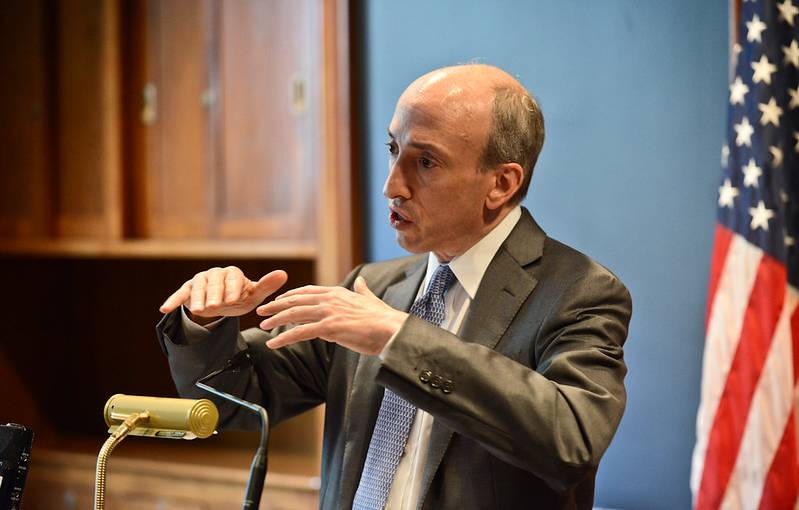The US securities watchdog has announced the biggest shake-up of equities trading rules in nearly two decades.
Last week, the SEC proposed creating a new best execution framework, changing how retail orders are processed, adopting variable tick sizes and a slew of other measures.
The proposals are partly a response to the meme-stock mania that gripped markets in early 2021, when retail investors engaged in a short squeeze with stocks like GameStop and AMC Entertainment Holdings.
The turmoil led to scrutiny of how retail orders are executed, in particular payment for order flow, where trading groups pay retail brokers to match trades internally.
More broadly, the SEC is seeking to modernize trading rules following years of technological advancement and structural change in the market, where an increasing proportion of buying and selling takes place on off-exchange venues, like wholesale firms and dark pools.
Best execution
One of the biggest changes proposed by the SEC is the creation of a new best execution framework operated by the commission. These rules would sit alongside existing best execution regulation run by the Financial Industry Regulatory Authority.
Under the reforms, broker-dealers would be required to ‘establish, maintain and enforce written policies and procedures reasonably designed to comply with the proposed best execution standard,’ says the commission.

‘I believe a best execution standard is too important, too central to the SEC’s mandate to protect investors, not to have on the books as commission rule text,’ says SEC chair Gary Gensler in a statement.
‘Today, equities often trade on off-exchange dark venues that have different business models and are less transparent than the familiar lit exchanges. Such developments in our markets make best execution that much more important.’
Retail orders
Another major aim of the reforms is to enhance retail-order execution. Currently, 90 percent of retail trades are routed to firms known as wholesalers, which normally execute those orders internally, says the SEC.
The lack of competition for retail orders leads to additional costs of $1.5 bn annually, the SEC estimates. Greater access to retail orders could also allow institutional investors to achieve lower trading costs, it adds.
The proposed rules would force wholesalers to include some retail orders in a ‘qualified auction’ run by an ‘open competition trading center’ before they could be matched internally, says the commission.
‘Everyday individual investors don’t have the full benefit of various market participants competing to execute their marketable orders at the best price possible,’ explains Gensler. ‘Thus, today’s proposal is designed to bring greater competition in the marketplace for retail market orders.’
Reg NMS amendments
In addition, the SEC is proposing a series of changes to Regulation NMS – the last major overhaul of US trading rules, which was implemented in 2005.
The amendments would adopt variable tick sizes, allowing greater freedom in the pricing of stocks currently constrained by minimum pricing increments, lower fees for accessing protected quotes and boost transparency around best priced orders.
‘A large and growing amount of equity trading now goes into what many call the dark markets, particularly off-exchange market centers such as wholesalers and dark pools,’ says Gensler.
‘Such off-exchange market centers, though, benefit from transacting using a different set of rules from the ones on national securities exchanges. This may undermine competition.’
A further proposal would update Rule 605 of Regulation NMS, which currently requires market centers to produce monthly reports on execution quality. The changes would expand the type of firms covered by the rule and modify what information needs to be disclosed.
Market reaction
The proposals have received a mixed response from market participants. IEX, the exchange group set up to address perceived unfairness in equity trading, has welcomed the changes.
‘We believe the reforms announced by the SEC represent a constructive and positive effort to improve transparency, increase competition and ensure investors can access the best prices available in the market,’ says Ronan Ryan, president and co-founder of IEX, in a statement.
In contrast, Kenneth Bentsen, CEO of the Securities Industry and Financial Markets Association (SIFMA), has urged the SEC to be ‘extremely careful’ with its reforms.
‘Any changes being proposed in the name of competition [that] may tilt the playing field at the expense of investors should be weighed carefully, be subject to a robust cost-benefit analysis and considered holistically with a view to ensuring there are no negative, unintended consequences for investors,’ he says in a statement posted on the SIFMA website.
IR impact
The number of active retail investors has grown significantly in recent years, leading IR teams to engage more actively with this group. Jeremy Apple, managing director at strategic communications firm Clermont Partners, says he doesn’t expect the proposals to lower retail participation in the market for now.
‘While the SEC’s proposed changes would limit payment for order flow, which has been a substantial catalyst for the advent of commission-free trading, in turn democratizing access to equity markets, I don’t envision these changes reversing the tide of retail investing at this point,’ he tells IR Magazine.
‘Companies with a large cohort of retail investors should stick to the same playbook of building robust materials that are both accessible and digestible for both institutional and non-institutional investors, working to ensure the narrative is being communicated widely and efficiently.’
Matthew Brusch, president and CEO of NIRI, says the association will keep a close eye on the reforms. ‘NIRI will be reviewing these new rule proposals, monitoring the proposal process over the coming months and providing members with the information and analysis necessary to support their role as capital markets experts,’ he says.










